Classic Commentaries and Studies on Corinthians Upgrade (12 vols.)
Digital Logos Edition
Overview
The Classic Commentaries and Studies on Corinthians Upgrade (12 vols.) provides even more valuable resources for studying Paul’s letters to the Corinthians. The critical interpretations, exegetical studies, discussions of thematic elements, semantic discourse, doctrinal interpretations, and practical applications found in this collection are only available together in this special upgrade to Classic Commentaries and Studies on Corinthians (29 vols.). This collection of nineteenth and twentieth-century scholarship is invaluable for students, scholars, pastors, historians, teachers of the Bible, or anyone studying the Epistles to the Corinthians.
Want more classic works on Corinthians? Check out Classic Commentaries and Studies on Corinthians (29 vols.), available now.

- 12 volumes of scholarship examining Corinthians
- A wide variety of angles and approaches to Scripture
- A balance of accessible and academic texts
- Title: Classic Commentaries and Studies on Corinthians Upgrade
- Volumes: 12
- Pages: 3,867
This title is included in the following collections
You can save when you purchase this product as part of a collection.
Classic Commentaries and Studi...
$97.99$97.99Logos 8 Collector's Edition Le...
$11,399.99$11,399.99Logos 9 Collector's Edition Le...
$11,399.99$11,399.99Logos 8 Ultimate Legacy Librar...
$21,749.99$21,749.99
- $24,999.99
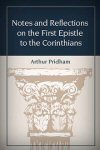
Notes and Reflections on the First Epistle to the Corinthians
- Author: Arthur Pridham
- Publisher: Longmans, Green, Reader, and Dyer
- Publication Date: 1866
- Pages: 452
Though primarily written for laity, Notes and Reflections on the First Epistle to the Corinthians offers insightful critical commentary of Scripture, making the text useful to scholars as well. Specific Scripture references are included, allowing the reader to carefully follow Pridham through 1 Corinthians.
A simple, useful volume . . . so far as we have read it, it seems to be quiet, spiritual, thoughtful, and profitable. . . . The private Christian who reads this volume, with the distinct desire to enter into this epistle, will find aids to the heart and mind, which will not be less than valuable.
—The Eclectic Review
Arthur Pridham is the author of numerous biblical commentaries, including Notes and Reflections on the Epistle to the Galatians, Notes and Reflections on Romans, Notes and Reflections on the Epistle to the Hebrews, and Notes and Reflections on the Epistle to the Ephesians.
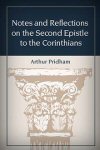
Though primarily written for laiety, Notes and Reflections on the Second Epistle to the Corinthians offers insightful critical commentary of Scripture, making the text useful to scholars as well. Specific Scripture references are included, allowing the reader to carefully follow Pridham through 2 Corinthians.
The main value of this work is to be found in its pious and practical ‘reflections,’ and in the clear and connected outline given of the apostle’s reasoning, and their application to the subject in hand.
—The Rock
Mr. Pridham does not pretend to critical research, but he illustrates the sacred word in a plain, practical, and devotional way; so that we doubt not the volume will be found instructive and profitable to the reader.
—Church of England Magazine
Arthur Pridham is the author of numerous biblical commentaries, including Notes and Reflections on the Epistle to the Galatians, Notes and Reflections on Romans, Notes and Reflections on the Epistle to the Hebrews, and Notes and Reflections on the Epistle to the Ephesians.
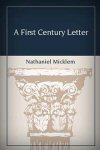
As a former student of James Moffatt, Nathaniel Micklem had access to a wealth of biblical wisdom. A First Century Letter seeks to imitate Paul’s use of common language to reveal truth and wisdom with the public as Micklem shares what he has learned through studying the works of leading theologians.
Nathaniel Wicklem (1888–1976) was a British theologian, political activist, and the principal of Mansfield College. His other work includes National Socialism and the Roman Catholic Church.
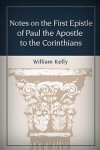
This volume contains William Kelly’s commentary on 1 Corinthians. Prior to Kelly’s notes and comments, the text includes Paul’s entire first letter to the Corinthians.
William Kelly (1823–1906) was educated at Trinity College in Dublin. He was highly involved with the Plymouth Brethren, and he served as editor for The Collected Writings of John Nelson Darby. His other works include The Second Advent of Christ Premillennial: A Reply to the Rev. D. Brown.
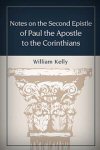
This volume contains William Kelly’s commentary on 2 Corinthians. Prior to Kelly’s notes and comments, the text includes Paul’s entire second letter to the Corinthians.
William Kelly (1823–1906) was educated at Trinity College in Dublin. He was highly involved with the Plymouth Brethren, and he served as editor for The Collected Writings of John Nelson Darby. His other works include The Second Advent of Christ Premillennial: A Reply to the Rev. D. Brown.
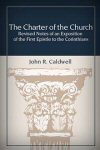
This volume presents a verse-by-verse commentary on 1 Corinthians. Caldwell draws from a wealth of theological research to present a thorough, easily-accessible analysis of Paul’s letter.
John R. Caldwell was an editor of The Witness, and the author of Foundations of the Faith, Christ in the Hebrews, and Things to Come.
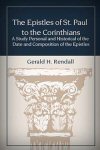
In this volume, Gerald Rendall seeks to test the cohesiveness of Paul’s letters to the Corinthians, examining them chronologically, historically, and psychologically. Rendall stresses the value of context, treating each individual verse in relation to the letters as a whole.
Gerald Henry Rendall (1851–1945) was an English educator and college administrator. He was educated at Harrow and Trinity College, Cambridge. His other works include Text and Commentary to Epistle of Barnabas, The Emperor Julian, Paganism, and Christianity, and Charterhouse Sermons.
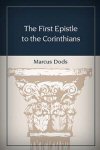
The First Epistle to the Corinthians
- Author: Marcus Dods
- Publisher: Hodder & Stoughton
- Publication Date: 1891
- Pages: 399
In this volume, Marcus Dods offers a practical exposition of 1 Corinthians, examining Paul, the Corinthians, and the culture surrounding them.
The most varied of Paul’s epistles demands in its expositor a combination of qualities which is very rarely met with. He who would read it aright from beginning to end must be theologian, casuist, and historian all in one; he must be equally at home in the ancient and the modern Church, in ancient and in modern life. There is probably no man living in whom these characters are more at one than Dr. Dods . . .
—A Thesaurus of the Best Theological, Historical, and Biographical Literature
Marcus Dods (1834–1909) was a Scottish divine, biblical scholar, and minister of the Free Church of Scotland. His other works include The Epistle to the Seven Churches, Israel’s Iron Age, Mohammed, Buddha, and Christ, Handbook on Haggai, Zechariah, and Malachi, and How to Become Like Christ.
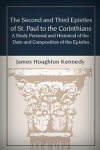
In The Second and Third Epistles of St. Paul to the Corinthians, James Houghton Kennedy argues that Paul’s letters to the Corinthians have been mistakenly identified as two letters and explains why the two books should instead be understood as three distinct writings. Using a blend of historical and contextual evidence, Kennedy pieces together the chronological story of the letters to build his case.
This is an interesting book, not merely in respect of its professed object, but also as giving the reader a glimpse into a scholar’s workshop.
—The Church Quarterly Review
James Houghton Kennedy was an assistant lecturer in divinity at the University of Dublin. He served as editor of S. Hippolytus on Daniel, and was the author of Natural Theology and Modern Thought.
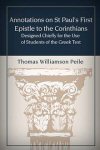
In this volume, Thomas Peile dissects the Greek text of 1 Corinthians, analyzing each verse and discussing key phrases.
Thomas Williamson Peile (1806–1882) was an author, divine, and a justice of the peace. He served as head-master of various schools, and eventually became vicar of Luton, Bedfordshire. As a scholar, he is primarily noted for his knowledge of the classics, particularly Thucydides and the Greek Testament.
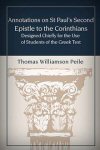
In this volume, Thomas Peile dissects the Greek text of 2 Corinthians, analyzing each verse and discussing key phrases.
Like the former portions, this volume shows signs of great care and thought . . .
—The Christian Remembrancer
Thomas Williamson Peile (1806–1882) was an author, divine, and a justice of the peace. He served as head-master of various schools, and eventually became vicar of Luton, Bedfordshire. As a scholar, he is primarily noted for his knowledge of the classics, particularly Thucydides and the Greek Testament.
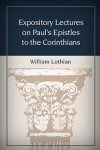
Expository Lectures on Paul’s Epistles to the Corinthians
- Author: William Lothian
- Publisher: Waugh & Innes
- Publication Date: 1828
- Pages: 552
This volume is based on a series of lectures William Lothian gave on Corinthians, fulfilling his wish that the wisdom imparted in his lectures on pastoral instruction would be accessible to the public. The text is intended to provide a balanced mix of critical analysis, commentary, and practical reflections.
The work does honor to the industry, the learning, the good sense, and the piety of its author. His style of composition is clear, correct, and simple; never mean, and sometimes very elegant.
—Evangelical Magazine
We can with all freedom recommend this work to the notice of our readers, as a clear and judicious exposition of an important portion of Scripture; and which, on account of its sound views and evangelical unction, may be read with profit by both ministers and people.
—Theological Magazine
We can cordially and confidently recommend the work to our readers, and the attention of the Christian public.
—Christian Herald
The whole exposition is excellent, containing an accurate and often critical explanation of the text, mixed with practical remarks, and breathing heart-felt piety.
—Congregational Magazine
William Lothian was a minister of the Congregational Church at St. Andrews, a teacher, and writer.
Reviews
5 ratings

M. David Johnson
3/27/2015

phillip davenport
1/19/2015
AeliusCicero
11/27/2014
Albert Cooper
11/18/2014